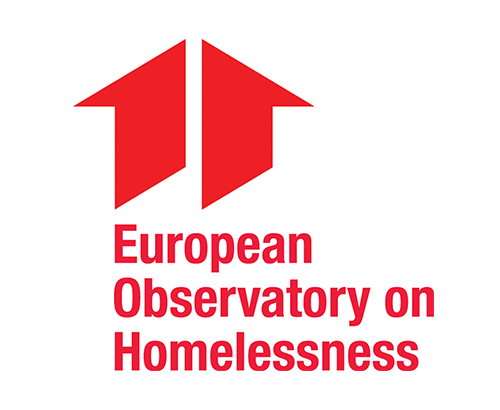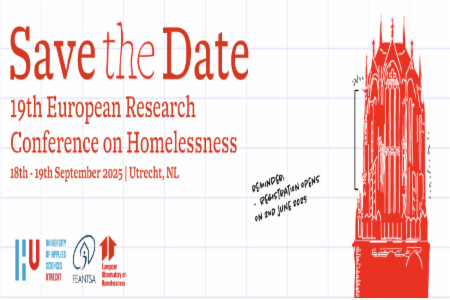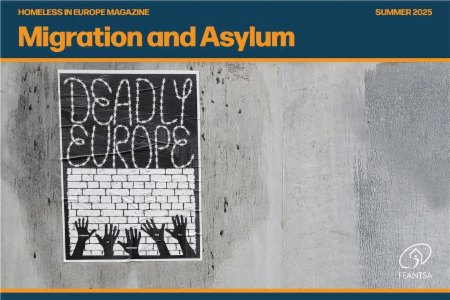Exiled and Homeless: New Asylum Crisis in Europe, Same Lack of Responses?
Download the statement here (PDF)
FEANTSA calls for immediate action to improve reception conditions for asylum seekers across Member States, particularly in regard to ensuring adequate and safe accommodation during the application process and beyond. We would like to raise awareness about the individuals and families with children who experience homelessness and insecure living conditions while waiting to apply for international protection (or after they have applied) across several EU Member States. We stress that this represents a violation of both EU law and of the international human rights of asylum seekers.
In 2020, in the context of the COVID19 pandemic, a decrease in asylum requests of 32,5% was registered by Eurostat, compared to 2019 (471 270 individuals requested international protection in 2020, vs 698 760 in 2019).[i] Nevertheless, recent political events occurring at global level in 2021 have forced a high number of individuals to flee from their origin countries in the pursuit of a safer place for them and their families. Eurostat registered an increase in the number of first-time asylum applicants, up by 115% in the second quarter (April 1st – June 30th) of 2021 compared to the same period of 2020[ii] with most people arriving from Syria, Afghanistan, Venezuela, Colombia and going to Germany, Spain and France.[iii] Confronted with these new migration waves, some MS are failing once again to comply with EU asylum standards and thus, to ensure an efficient reception system. At the same time, European Commission migration policies focusing on return policy and border strengthening do not contribute to improving the reception system within the Union, leaving the degree of support available to people in distress at the discretion of MS.
In the past months, as winter set in and temperatures dropped, we have been increasingly frequently confronted with images and stories of people in limbo, who are lacking even a minimal protection of their basic rights (information on developments from several MS available in the Background information section). Asylum seekers are seen waiting in long lines in front of reception centres and sometimes spending numerous nights sleeping in the streets because of a lack of accommodation. Overcrowding and lack of quality in the reception system are also common, with people sleeping in tents, on camp beds, without any privacy and for longer time that initially planned. Homeless service providers have been at the centre of this crisis in recent years as asylum seekers (as well as refugees) have sought refuge in shelters because of a lack of other alternatives.[iv] This situation comes as a result of overcrowding in the national reception systems, lack of infrastructure and a backlog in housing for recognised refugees, issues that FEANTSA has already denounced in the past.[v]
Despite the EU Common European Asylum System (CEAS)[vi] setting out common standards and co-operation to ensure that asylum seekers receive equal treatment and have their rights respected throughout the application, in practice these provisions fail to be implemented. Access to adequate accommodation for people seeking and granted international protection is part and parcel of any functioning asylum system and these standards should be complied with by all MS under the supervision of the European Commission. MS are far from managing the asylum proceedings in solidarity and under a common approach, as the measures implemented lack coordination and differ from country to country. What they do have in common is a violation of human rights coupled with negative attitudes towards asylum seekers who have travelled very dangerous routes while fleeing persecution to reach European territory.
FEANTSA has reported these human rights violations repeatedly, in particular documenting situations of homelessness among asylum seekers. In our Fifth Overview of Housing Exclusion[vii] (2020) report we show that homelessness among people in exile increased in all countries where data were available: in Greece, 51% of almost 4000 unaccompanied minors were sleeping rough, while in Germany families with children accounted for over 27% of homeless refugees. In Brussels, 25% of 276 homeless individuals surveyed in 2018 were asylum seekers. According to the latest European Asylum Support Organisation (EASO) report published in February 2021,[viii] the COVID19 pandemic has worsened the situation for asylum seekers and refugees, making it even more difficult for newly recognised refugees to find jobs or making them unemployed and so at risk of homelessness or unsafe and overcrowded housing. FEANTSA members who are homeless service providers have also noted the increasing presence of asylum seekers and refugees in their services. Often, homeless service providers are under pressure because the number of beds and the quality of services that they can offer are also reduced, while in general there is a lack of shelters for homeless people across the EU.
These situations are a result of the uncoordinated and fractured actions by MS and the EC which, in a general context of structural problems in MS’ housing markets may lead to a new crisis in the European asylum system. To improve the national asylum reception systems within MS and align them to European standards, we call on the European Commission to:
- Coordinate with MS and ensure that minimum standards of the reception conditions are fulfilled according to EU asylum legislation. This could be achieved through the newly established European Union Asylum Agency.[ix] Episodic homelessness and the unsafe living conditions of asylum seekers need to be addressed urgently.
- Invest in the reception system so as to improve the quality of services and adopt measures for improving access to adequate housing at all stages for asylum seekers.
- Monitor closely the access to housing for asylum seekers and for those individuals who have acquired international protection within MS.
- Acknowledge the important role that the homeless sector plays in providing asylum seekers (as well as recognised refugees and those whose applications were rejected) with accommodation and other basic support and involve these actors in the development of asylum and migration policies.
We also call on Member States to address the situation of asylum seekers at national level by:
- Improving their reception system by setting up realistic, fair, and fast national asylum procedures and ensuring that there are enough accommodation spaces and social support for those applying.
- Governments must actively work towards the full realisation of the right to adequate housing for all. Camps and reception centres must only be used as temporary measures and must comply with minimum standards.
Background information
Legal provisions
The right to ask for asylum is guaranteed by the Charter of Fundamental Rights of the European Union: “the right to asylum shall be guaranteed with due respect for the rules of the Geneva-Convention of 28 July 1951 and the Protocol of 31 January 1967 relating to the status of refugees and in accordance with the Treaty on European Union and the Treaty on the Functioning of the European Union.” (Article 18)[x].
Directive 2003/9 of 27 January 2003, laying down minimum standards for the reception of asylum seekers in the Member States, required that states guarantee asylum seekers the following: (1) Certain material reception conditions, including accommodation; food and clothing, in kind or in the form of monetary allowances (which must be sufficient to protect the asylum seeker from extreme need); (2) Arrangements to protect family unity; (3) Medical and psychological care; and (4) Access for minors to education, and to language classes when necessary for them to undergo normal schooling.[xi] As this Directive allowed Member States ‘a wide margin of discretion concerning the establishment of reception conditions at national level’ a recast was adopted in 2013. Directive 2013/33/EU of the European Parliament and of the Council[xii] establishes the standards for the reception of applicants for international protection. The standards are intended to ensure a dignified standard of living and comparable living conditions in all the Member States for the reception of applicants. Article 17 requires that Member States ensure that the reception conditions meet “an adequate standard of living for applicants, which guarantees their subsistence and protects their physical and mental health.” Likewise, Article 19 requires that Member States ensure that applicants receive the necessary health care, and medical or other assistance.
In July 2016, the Commission presented a proposal to revise the Reception Conditions Directive aiming at further harmonising the reception conditions in the EU as the Commission observes that reception conditions ‘continue to vary considerably between Member States both in terms of how the reception system is organised and in terms of the standards provided to applicants. The Commission proposes to add ‘other essential non-food items matching the needs of the applicants in their specific reception conditions, such as sanitary items’, to the definition of material reception conditions (Article 2(7)).
On 23rd of September 2020, the European Commission adopted the long-awaited New Pact on Migration and Asylum,[xiii] in the midst of the tragic events in Moria (Greece).[xiv] While the pact was supposed to bring a “human and humane approach”[xv] and more efficient procedures that would clarify responsibilities, more than one year after the launch of the Pact the situation on the ground has clearly not improved in the asylum reception system.
A worsening situation - neither human, nor humane
An overwhelming number of asylum seekers have arrived in Brussels in the past months. The European capital cannot ensure that all of those asking for international protection can obtain safe shelter while waiting to submit their application.[xvi] In the past weeks, multiple reports of people sleeping in the street in cold temperatures have been made and the bad management of responsible authorities in this field has brought workers from the Federal Agency for the Reception of Asylum Seekers (FEDASIL) and their civil society partners to the streets to demonstrate and call for appropriate decisions to be made by national authorities to ensure adequate reception conditions for all asylum applicants .[xvii]
In the Netherlands, the Central Agency for the Reception of Asylum Seekers (COA) announced last week that it needed 12,000 extra reception places in asylum seekers' centres for next year.[xviii] The reception system is also overwhelmed and offers poor conditions for those seeking refuge – people sleep in tents or in halls with no privacy, high levels of noise and no psychosocial support. Access to food and access to school for children is also missing most of the time.
Greece has been in the news across the world on account of the worsening conditions experienced by migrants, asylum seekers and refugees on the islands and mainland.[xix] A high number of recognised refugees (and individuals whose request for asylum has been rejected) still live in camps or are experiencing homelessness due to a lack of viable housing alternatives. The shortage of housing and the risk of homelessness for refugees following the announced terminations of European Commission funded, UNHCR and state accommodation programmes were signalled to the Commission, even before the global coronavirus health crisis. Available data also showed that in Greece, the number of homeless people in exile was increasing and leading to homelessness services becoming involved in supporting asylum seekers and refugees, while 16% of the 3,774 unaccompanied minors in the country were sleeping rough.[xx] Despite early warnings, the situation continued to worsen as the policies to remove refugees from accommodation were implemented.
The situation at the Belarus-Poland border is one without precedent in Europe. People, among them families with children, have been turned back several times at the Polish-Belarusian border[xxi] and left to live in hiding in the forest, experiencing very low temperatures. Official cases of death among refugees, including children and women have been registered.[xxii] To respond to this concerning situation, the European Commission issued on the 1st of December 2021 a Proposal for a COUNCIL DECISION on provisional emergency measures for the benefit of Latvia, Lithuania and Poland[xxiii] aiming at improving measures taken by concerned MS in implementing material reception conditions, “(…) including temporary shelter adapted to the seasonal weather conditions, food, water, clothing, adequate medical care, and assistance to vulnerable persons, in full respect of human dignity”.[xxiv] The initiative is considered controversial and detrimental to the right to asylum, by international organisations. It has been noted that instead of facilitating support, the proposal will contribute to punishing people and weaken asylum protections.[xxv] This new proposal is still under approval and during this time, people continue to experience human rights violations and lethal conditions.
In France, there are many asylum seekers among those sleeping in informal settlements at the margins of the big cities. The estimation is that one in two asylum seekers will not have access to the reception system. Individuals are often turned away and, lacking a support network, will return to the national homeless shelters or to informal settlements time and time again.[xxvi] In July 2020, the European Court of Human Rights ruled that France must pay economic compensation to three asylum seekers who lived on the streets for months. The court established that the asylum seekers were victims of “degrading treatment” as they were forced into sleeping rough, had no access to sanitary facilities and lived in constant fear of being attacked.[xxvii]
Despite the closure of borders determined by the pandemic, in 2020, Spain received as many as 84,000 asylum requests.[xxviii] The Spanish asylum system has been overwhelmed for a long time: in Catalonia, a CASASIL survey carried out between April and September 2019 showed that 26.6% of the 300 people interviewed had slept in the street at some point after arriving; for those arriving after 2018 the percentage raised to 32.8%.[xxix] A solution to sleeping rough has been to direct asylum seekers to accommodation in shelters for homeless people or other emergency facilities provided by local administrations, which are also supra-solicited sectors in the country.
[i] https://ec.europa.eu/eurostat/statistics-explained/index.php?title=Asylum_statistics#Number_of_asylum_applicants:_decrease_in_2020
[ii] https://ec.europa.eu/eurostat/web/products-eurostat-news/-/ddn-20210924-1
[iii] https://ec.europa.eu/eurostat/statistics-explained/index.php?title=Asylum_statistics#Number_of_asylum_applicants:_decrease_in_2020
[iv] https://www.feantsaresearch.org/download/feantsa-studies_06_web1893761109777125727.pdf
[v] https://www.feantsa.org/en/feantsa-position/2016/05/30/feantsa-position-how-to-guarantee-adequate-reception-conditions-of-asylum-seekers-a-homeless-service-providers-perspective?bcParent=27
[vi] https://ec.europa.eu/home-affairs/policies/migration-and-asylum/common-european-asylum-system_en
[vii] https://www.feantsa.org/en/news/2020/07/23/fifth-overview-of-housing-exclusion-in-europe-2020
[viii] https://easo.europa.eu/sites/default/files/EASO-Asylum-Report-2021.pdf
[ix] https://www.consilium.europa.eu/en/press/press-releases/2021/12/09/migration-and-asylum-pact-council-adopts-eu-asylum-agency-regulation/
[x] Charter of Fundamental Rights of the European Union, Article 18.
[xi] COUNCIL DIRECTIVE 2003/9/EC of 27 January 2003 laying down minimum standards for the reception of asylum seekers.
[xii] DIRECTIVE 2013/33/EU OF THE EUROPEAN PARLIAMENT AND OF THE COUNCIL of 26 June 2013 laying down standards for the reception of applicants for international protection (recast).
[xiii] https://ec.europa.eu/info/strategy/priorities-2019-2024/promoting-our-european-way-life/new-pact-migration-and-asylum_en
[xiv] https://www.feantsa.org/en/news/2020/09/15/immediate-action-needed-ensure-dignified-accommodation-for-asylum-seekers-and-refugees-formerly-residing-in-the-moria-reception-identification-centre?bcParent=27
[xv] https://ec.europa.eu/commission/presscorner/detail/en/AC_20_1698
[xvi] https://www.euronews.com/2021/12/07/belgium-s-system-for-asylum-seekers-unable-to-cope-as-winter-closes-in and https://www.rtl.be/info/belgique/faits-divers/demandeur-d-asile-refuses-au-petit-chateau-1338553.aspx
[xvii] https://www.facebook.com/MedecinsDuMondeBelgique/photos/a.373795586019333/4623703434361839
[xviii] https://nos.nl/artikel/2408630-noodopvang-asielzoekers-in-tenten-en-hallen-zo-snel-mogelijk-stoppen
[xix] https://www.feantsa.org/en/news/2021/12/13/joint-campaign-improve-conditions-for-migrants-asylum-seekers-and-refugees-in-greece-now?bcParent=26
[xx] National Centre for National Centre for Social Solidarity (EKKA), 2019. Available at http:// www.ekka.org.gr/ images/EKKA_ Dashboard _31-3-2019.pdf, quoted in FEANTSA and Abbe Pierre Foundation, 5th Overview of Housing Exclusion in Europe.
[xxi] https://rm.coe.int/communique-comite-migration-situation-frontiere-polonaise-belarus-en/1680a46305
[xxii] https://www.eui.eu/events?id=545036
[xxiii] https://eur-lex.europa.eu/legal-content/EN/TXT/?uri=COM%3A2021%3A752%3AFIN&qid=1638547296962
[xxiv] https://ec.europa.eu/commission/presscorner/detail/en/IP_21_6447
[xxv] https://www.amnesty.org/en/latest/press-release/2021/12/eu-exceptional-measures-normalize-dehumanization-of-asylum-seekers/
[xxvi]https://www.cidob.org/en/publications/publication_series/notes_internacionals/237/politicas_de_la_indigencia_solicitantes_de_asilo_sin_casa_en_europa
[xxvii] https://www.dw.com/en/european-human-rights-court-condemns-france-for-treatment-of-asylum-seekers/a-54026049
[xxviii] https://elpais.com/espana/2021-01-01/espana-vuelve-a-ser-la-principal-puerta-de-entrada-de-la-ue-para-la-inmigracion-irregular.html
[xxix]https://www.cidob.org/en/publications/publication_series/notes_internacionals/237/politicas_de_la_indigencia_solicitantes_de_asilo_sin_casa_en_europa




